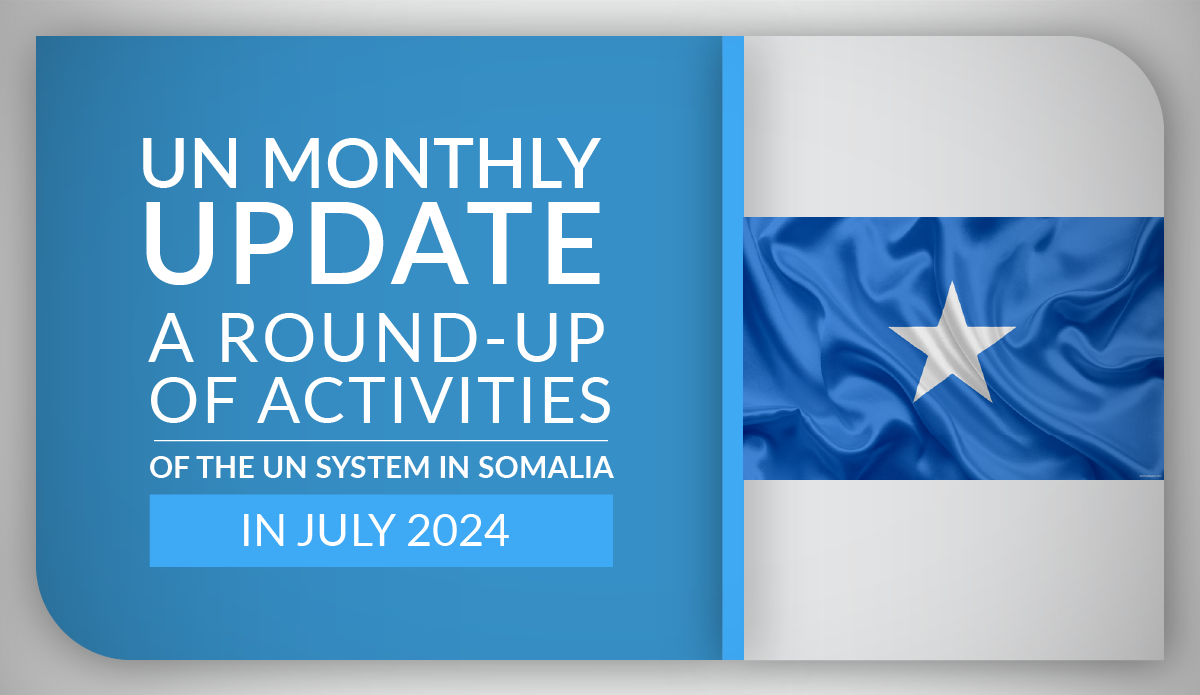A round-up of activities of the UN system in Somalia in July 2024
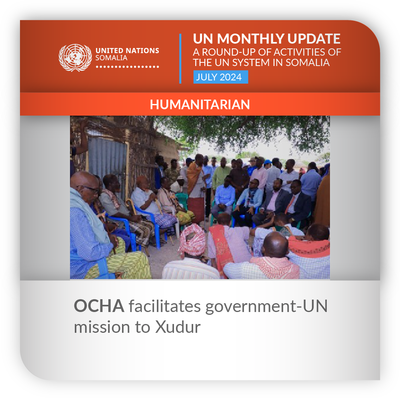 |
Humanitarian | OCHA facilitates government-UN mission to Xudur OCHA facilitated a joint government-UN mission to Xudur town, in the Bakool region of Somalia’s South West State. The mission, led by the Commissioner of the Somali Disaster Management Agency, Mohamud Moallim Abdule, visited the Daryeel and Horseed settlements for internally displaced people. The two locations host more than 28,200 people, most of whom arrived in the last six months. According to OCHA, the community reported a lack of basic necessities, including water, sanitation, health and education. The UN agency also noted that, during the mission, emphasis was placed on the prioritization of the humanitarian response given the limited resources and zero tolerance to aid diversion. |
|
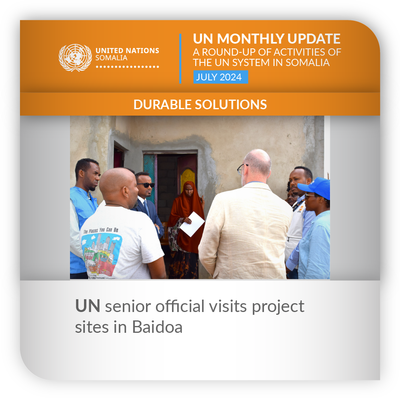 |
Durable Solutions | UN senior official visits project sites in Baidoa The UN Secretary-General’s Deputy Special Representative for Somalia, George Conway – who also serves as the UN Resident Coordinator and Humanitarian Coordinator – visited Baidoa, the largest city in Somalia’s South West State, to examine the extent to which UN interventions provide durable solutions to the communities they work with. Mr. Conway visited model projects such as UN-Habitat's housing project, which provides 200 permanent houses to internally displaced people (IDPs) as part of efforts to facilitate their integration into local communities. This initiative has been successful following the operationalisation of the UN-Habitat supported Urban Land Management Law, which saw IDPs issued with title deeds, promoting land tenure security. UN-Habitat also helped the local government come up with the Baidoa City Strategy. Its implementation informed the site selection and planning for the construction of the permanent houses. According to UN-Habitat, the strategy provides a clear direction for sustainable urban growth of the city, while implementing interventions that promote durable solutions. |
|
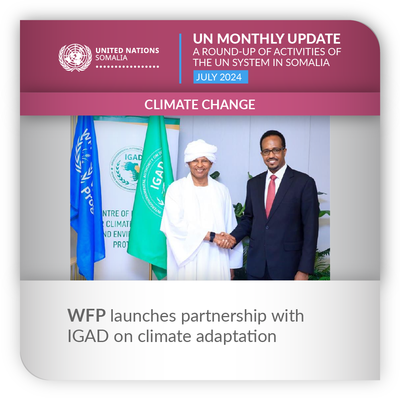 |
Climate Change | WFP launches partnership with IGAD on climate adaptation WFP and the Intergovernmental Authority on Development (IGAD) signed a letter of understanding to strengthen climate adaptation knowledge management and capacity development of relevant Somali institutions. Somalia is suffering the effects of climate shocks. This partnership aims to facilitate the replication and scaling-up of locally-led adaptation solutions and best practices. |
|
 |
Capacity-building | UNSOS prepares Somali vendors to supply food rations UNSOS hosted a seminar to prepare Somali-owned businesses to bid for UN contracts to supply food rations. The seminar, which attracted more than 50 local companies, was facilitated by UNSOS and the UN Department of Operational Support (DOS). It aimed at informing vendors of the requirements of UN contracts to enhance their capacity to bid; the gathering was the first-ever thematic seminar for rations jointly organized by UNSOS and DOS. In addition to raising awareness among the local vendors, the event also sought participants’ views on the UN processes to build stronger partnerships. |
|
 |
Development | UNIDO supports solar water desalination in Puntland UNIDO supported the installation of a solar photovoltaic water desalination facility in Waaciye, in Somalia’s northern Federal Member State of Puntland. According to UNIDO, the innovative water treatment facility provides clean and safe water to a population of more than 8,300 people in the region, enhancing the community's resilience to climate change. Japan provided the funding for the project. As part of the project, 15 local Somalis received training to operate the facility, creating employment opportunities and ensuring long-term sustainable access to water. UNIDO notes that by leveraging public-private partnerships, the facility's capacity has expanded to produce up to 100,000 litres of potable water per day, improving living standards and creating opportunities in farming. |
|
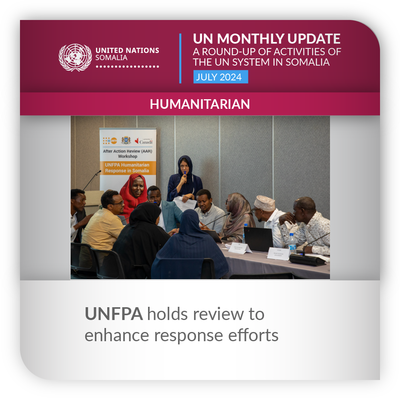 |
Humanitarian | UNFPA holds review to enhance response efforts UNFPA held a key ‘After Action Review Workshop’ to help enhance its humanitarian response efforts. Over the intensive two-day session, delegates from the Somali Government and humanitarian implementing partners, along with UNFPA staff, gathered in Mogadishu to share insights, collaborate, and strategize. According to UNFPA, the workshop fostered a collaborative environment, highlighting best practices and lessons learned. UNFPA stated that such gatherings are essential for developing a comprehensive action plan to enhance the efficiency and impact of humanitarian assistance. It added that the unity and commitment displayed during the workshop underscored the importance of collaboration in addressing Somalia’s complex humanitarian challenges. |
|
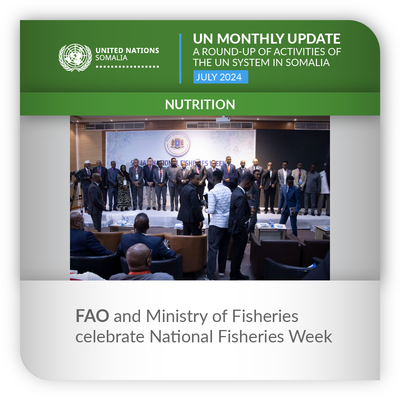 |
Nutrition | FAO and Ministry of Fisheries celebrate National Fisheries Week Somalia's fisheries sector and its vast potential were highlighted during the National Fisheries Week, which ran from 3-9 July.The event was organized by the Ministry of Fisheries and Blue Economy, with support from FAO and other partners. The week brought together fishermen, fish farmers and government officials, along with representatives from the private sector, civil society and international partners, to celebrate Somalia's marine resources, as well as promote sustainable practices, coastal community empowerment, and marine conservation. The week’s events included workshops, exhibitions and outreach programmes on sustainable fisheries, cultural preservation, innovation, and climate adaptation. According to FAO, the event raised awareness of the fisheries sector’s role in economic growth and community livelihoods, ensuring future generations benefit from Somalia’s marine resources. |
|
 |
Health | WHO: immunization task force kicks off activities The Somalia Immunization and Polio Eradication Task Force (SIPE) kicked off its activities, following its launch in late June. SIPE is made up of key health officials at federal and state levels, and international partners. “The establishment of the national task force on immunization and polio is a testament to my government’s commitment to this cause,” Somalia’s Prime Minister of Somalia, Hamza Abdi Barre, said at the launch of SIPE, which he chairs. “We commit to prevent the vaccine preventable diseases as a leading cause of child mortality and efforts to improve vaccination in Somali as priority for the Government,” he added. According to WHO, the task force signifies Somalia’s commitment at a very high political level to stopping polio, which has been circulating in Somalia uninterrupted for seven years, and immunizing children against vaccine preventable diseases. |
|
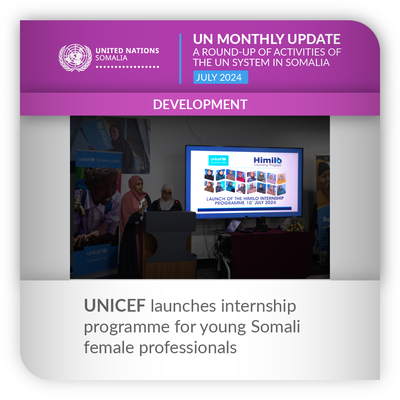 |
Development | UNICEF launches internship programme for young Somali female professionals UNICEF launched the Himilo Internship Programme, which is designed to empower young Somali women with essential skills and experience, attract qualified Somali female graduates to join the UN children’s agency, improve the gender parity ratio and promote inclusivity. So far for the initiative, UNICEF has formalized partnerships with four tertiary education institutions – SIMAD University, Benadir University, Mogadishu University, and the Somali National University – through memoranda of understanding. Plans are underway to expand the partnership to other universities in Somalia, with a focus on under-represented minorities and people with disabilities. Sixteen interns have so far been selected through a competitive process that involved written assessments and interviews. According to UNICEF, the interns are not only contributing to achievement of results but are acquiring practical, hands-on skills and taking advantage of numerous online learning resources. |
|
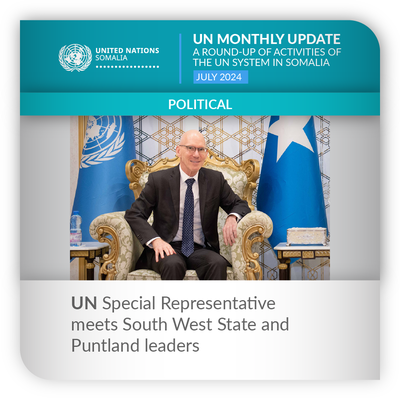 |
Political | UN Special Representative meets South West State and Puntland leaders As part of his first round of in-person engagements with the leaders of the country’s Federal Member States (FMSs), the Acting UN Special Representative for Somalia, James Swan, visited South West State and Puntland. Early in July, in the city of Baidoa he met with South West State’s President Abdiaziz Hassan Mohamed ‘Laftagareen,’ with whom he discussed a wide range of topics related to security and state-building in Somalia and the FMS. “I commend President Abdiaziz's commitment to advancing state-building, as well as to fight Al-Shabaab in the South West State. The United Nations is committed to supporting the government's efforts to promote peace, stability, and development across Somalia,” Mr. Swan said at a press encounter. Among the national priorities the pair discussed were issues related to Somalia’s constitutional review and plans for elections. “We acknowledge that President Abdiaziz has played a constructive role in these processes,” Mr. Swan added. Later in the month, on a visit to Puntland’s capital, Garowe, the top UN official met with President Said Abdullahi Mohamed ‘Deni.’ On issues of national importance, President Deni and Mr. Swan discussed topics which included the ongoing campaign against the Al-Shabaab terrorist group, the constitutional reform process, and the next election cycle. The Acting UN Special Representative noted that, while Somalia had achieved tremendous progress in recent years, many challenges remained, and he highlighted the need for agreement and cooperation. “In light of this reality, I expressed the view that it would be to the benefit of the Somali people if the country’s senior leaders – the Federal Government President and Federal Member State Presidents – could overcome any outstanding differences and find a way to work together, to agree on solutions to these national challenges, and then to take action in unity,” said Mr. Swan. |
|
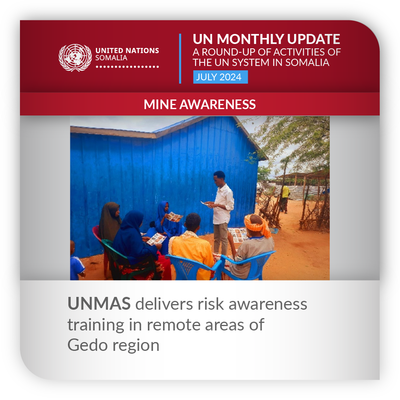 |
Mine awareness | UNMAS delivers risk awareness training in remote areas of Gedo region Protracted armed conflict and a deteriorating humanitarian situation have led to explosive remnants of war contaminating the Luuq district in Somalia’s southern Gedo region – recently, two boys were injured in an explosive ordnance incident, which occurred at a pasture near Luuq town. In response, UNMAS deployed community liaison officers (CLOs) to engage with the victims and their families, and they discovered the need for explosive ordnance risk education (EORE) in remote villages in the area. Due to security concerns that affect access to these remote areas, the CLOs implemented an alternative approach – the provision of Training-of-Trainers (ToT) – to village activists who, in turn, deliver EORE to their communities. A total of five key community members of the village – three women, two men – received EORE ToT and materials, including leaflets and risk education devices, to raise awareness among their communities. |
 UN
UN
